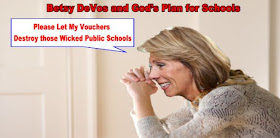Does Religion Have a Place in Public Schools?
“The question of what to do with religion in school-choice programs is how, or whether, to keep the baby while ditching the bathwater.”


From the standpoint of democratic theory, the basic problem with school choice is this: Religious belief and affiliation can be vital sites of civic learning for many Americans. In their temples, mosques, and megachurches, Americans learn to cooperate, organize, identify, and engage with social problems. These skills help them develop the kind of bonding capital that forms the basis of a democracy; from that platform, citizens can develop the bridging capital that allows them to identify with and engage civil society as a whole.
On the other hand, some religious groups preach beliefs and false information that are hostile to fellow citizens and dangerous to civil society. Any old bonding capital is not good enough. As John Dewey once observed, belonging to a gang may provide a member with opportunities for connection and growth, but toward the pursuit of destructive ends. The question of what to do with religion in school-choice programs is how, or whether, to keep the baby while ditching the bathwater.
In some ways, deregulating public education and transcending the geographic limitations of 19th-century districting laws can enhance democratic education. Giving families a stronger sense of control and making schools more culturally relevant can help make public schooling more legitimate, bringing groups of outsiders into the public fold. Stephen Macedo, a politics professor at Princeton University, has argued that such strings can even encourage religious groups to modify their beliefs and practices. Large, public school districts can be highly impersonal and bureaucratic—indeed, a popular reform in the early 21st century was to create smaller schools, including schools within schools. High-quality regulations and curriculum standards, robust oversight and accountability, and careful attention to school climate can potentially make charter schools excellent places to learn and can make them attractive alternatives to traditional public schools where such things are insufficient.
Likewise, as Kathleen Knight Abowitz, an education professor at Miami University, has argued, themed charter schools have the potential to create “counterpublics” for members of oppressed groups where they can enjoy safety and build solidarity in cases when pluralistic public schools cannot offer them adequate protections.
Unfortunately the reverse can also be true—individuals and groups can use school choice to promote their private interests in ways that undermine the common good. Rather than changing the views of antidemocratic groups, choice programs can provide them with publicly funded platforms for spreading their ideology, while strings are either loosened, twisted, or dropped by the secular authorities who have no interest in holding them. Private religious schools can convert to public ones with little substantive change in whom they teach and to what ends. School leaders can wink at state and federal regulations, sneak religion into the curriculum, and in the most egregious (but predictable) exampleCharter Schools Blur Line Between Religious, Public Education - The Atlantic:
